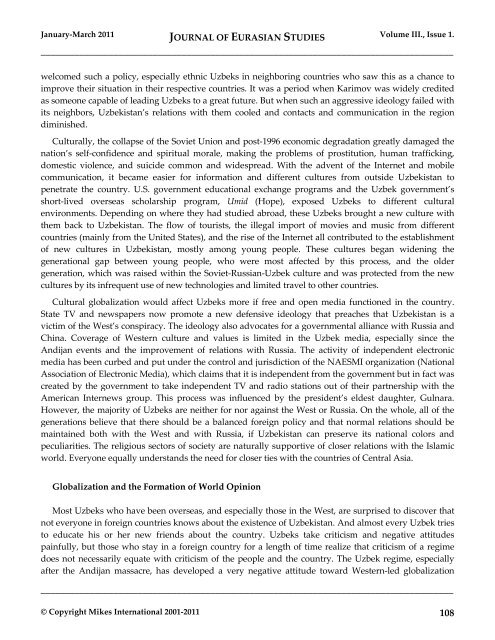JOURNAL OF EURASIAN STUDIES
JOURNAL OF EURASIAN STUDIES
JOURNAL OF EURASIAN STUDIES
Create successful ePaper yourself
Turn your PDF publications into a flip-book with our unique Google optimized e-Paper software.
January-March 2011 <strong>JOURNAL</strong> <strong>OF</strong> <strong>EURASIAN</strong> <strong>STUDIES</strong> Volume III., Issue 1.<br />
_____________________________________________________________________________________<br />
welcomed such a policy, especially ethnic Uzbeks in neighboring countries who saw this as a chance to<br />
improve their situation in their respective countries. It was a period when Karimov was widely credited<br />
as someone capable of leading Uzbeks to a great future. But when such an aggressive ideology failed with<br />
its neighbors, Uzbekistan’s relations with them cooled and contacts and communication in the region<br />
diminished.<br />
Culturally, the collapse of the Soviet Union and post-1996 economic degradation greatly damaged the<br />
nation’s self-confidence and spiritual morale, making the problems of prostitution, human trafficking,<br />
domestic violence, and suicide common and widespread. With the advent of the Internet and mobile<br />
communication, it became easier for information and different cultures from outside Uzbekistan to<br />
penetrate the country. U.S. government educational exchange programs and the Uzbek government’s<br />
short-lived overseas scholarship program, Umid (Hope), exposed Uzbeks to different cultural<br />
environments. Depending on where they had studied abroad, these Uzbeks brought a new culture with<br />
them back to Uzbekistan. The flow of tourists, the illegal import of movies and music from different<br />
countries (mainly from the United States), and the rise of the Internet all contributed to the establishment<br />
of new cultures in Uzbekistan, mostly among young people. These cultures began widening the<br />
generational gap between young people, who were most affected by this process, and the older<br />
generation, which was raised within the Soviet-Russian-Uzbek culture and was protected from the new<br />
cultures by its infrequent use of new technologies and limited travel to other countries.<br />
Cultural globalization would affect Uzbeks more if free and open media functioned in the country.<br />
State TV and newspapers now promote a new defensive ideology that preaches that Uzbekistan is a<br />
victim of the West’s conspiracy. The ideology also advocates for a governmental alliance with Russia and<br />
China. Coverage of Western culture and values is limited in the Uzbek media, especially since the<br />
Andijan events and the improvement of relations with Russia. The activity of independent electronic<br />
media has been curbed and put under the control and jurisdiction of the NAESMI organization (National<br />
Association of Electronic Media), which claims that it is independent from the government but in fact was<br />
created by the government to take independent TV and radio stations out of their partnership with the<br />
American Internews group. This process was influenced by the president’s eldest daughter, Gulnara.<br />
However, the majority of Uzbeks are neither for nor against the West or Russia. On the whole, all of the<br />
generations believe that there should be a balanced foreign policy and that normal relations should be<br />
maintained both with the West and with Russia, if Uzbekistan can preserve its national colors and<br />
peculiarities. The religious sectors of society are naturally supportive of closer relations with the Islamic<br />
world. Everyone equally understands the need for closer ties with the countries of Central Asia.<br />
Globalization and the Formation of World Opinion<br />
Most Uzbeks who have been overseas, and especially those in the West, are surprised to discover that<br />
not everyone in foreign countries knows about the existence of Uzbekistan. And almost every Uzbek tries<br />
to educate his or her new friends about the country. Uzbeks take criticism and negative attitudes<br />
painfully, but those who stay in a foreign country for a length of time realize that criticism of a regime<br />
does not necessarily equate with criticism of the people and the country. The Uzbek regime, especially<br />
after the Andijan massacre, has developed a very negative attitude toward Western-led globalization<br />
_____________________________________________________________________________________<br />
© Copyright Mikes International 2001-2011 108

















